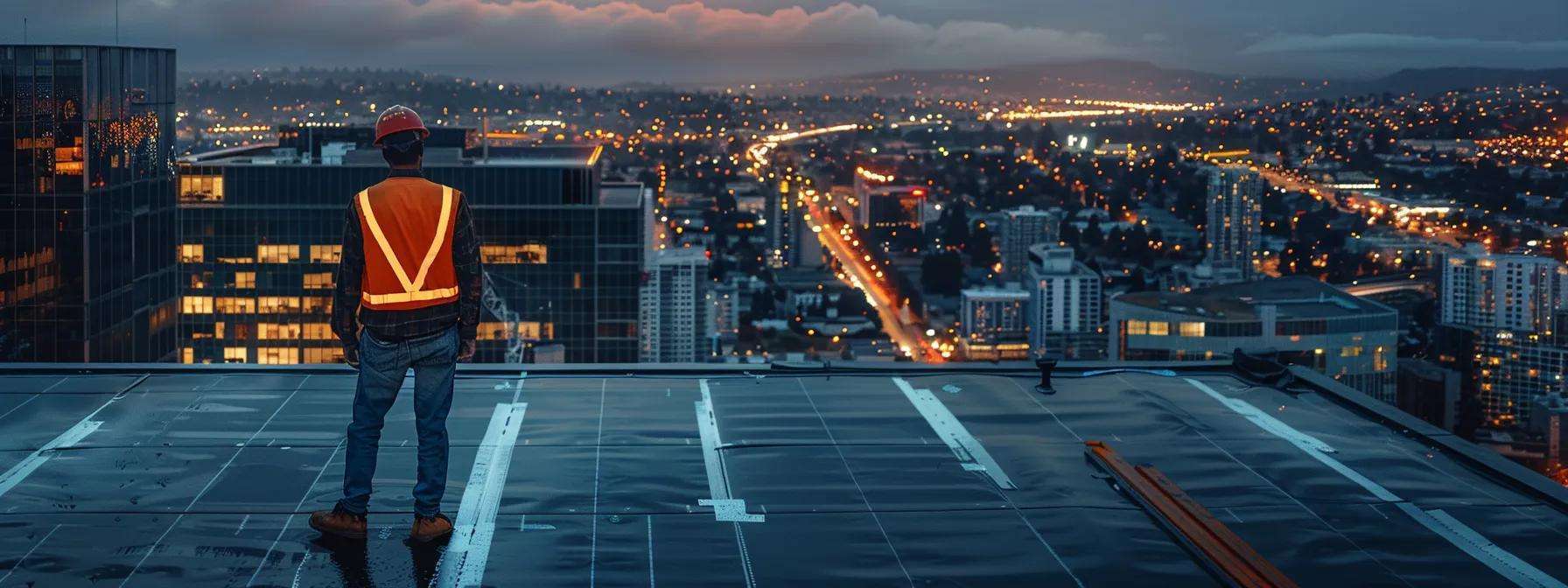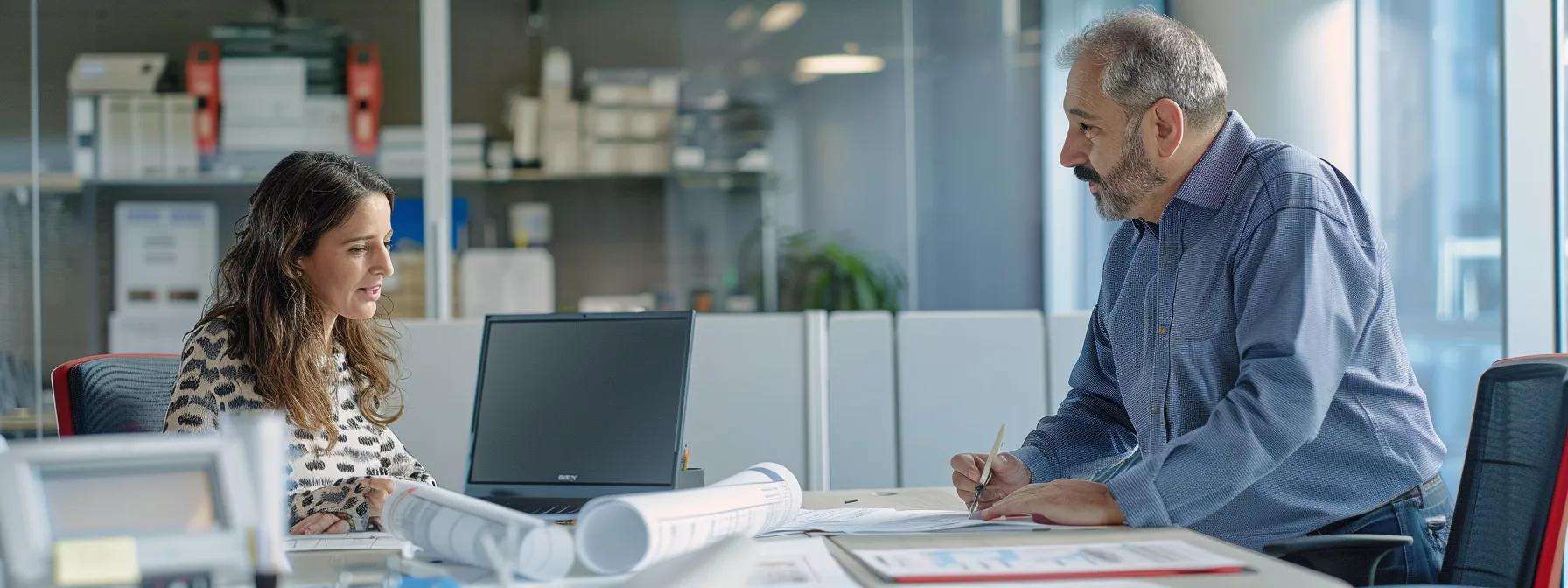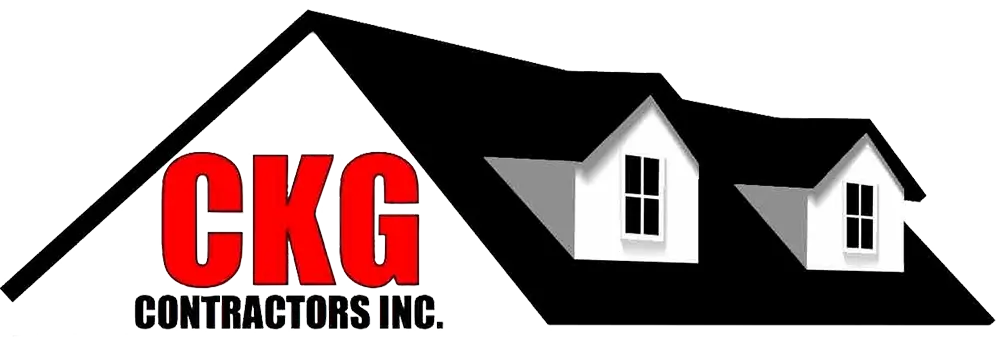Table Of Contents:
- What Sets a Professional Commercial Roofing Contractor Apart From General Roofers?
- What Specialized Expertise Do Professional Commercial Roofing Contractors Offer?
- How Do Professional Commercial Roofing Contractors Ensure Superior Quality?
- How Do Professional Commercial Roofing Contractors Ensure Superior Quality? (Continued)
- How Do Professional Commercial Roofing Contractors Ensure Superior Quality? (Final Thoughts)
- Why Is Compliance With Building Codes and Safety Standards Critical for Commercial Roofing?
- Why Is Compliance With Building Codes and Safety Standards Critical for Commercial Roofing? (Conclusion)
- How Do Professional Commercial Roofing Contractors Minimize Business Disruption?
- How Do Professional Commercial Roofing Contractors Minimize Business Disruption? (Summary)
- What Value Do Professional Commercial Roofing Contractors Provide Through Customer Service and Support?
- What Value Do Professional Commercial Roofing Contractors Provide Through Customer Service and Support? (Conclusion)
- How Do Pricing and Cost Transparency Differ Between Commercial Roofing Contractors and General Roofers?
- How Do Professional Commercial Roofing Contractors Minimize Business Disruption? (Revisited)
- What Are the Key Benefits of Hiring a Professional Commercial Roofing Contractor Over a General Roofer?
- What Are the Key Benefits of Hiring a Professional Commercial Roofing Contractor Over a General Roofer? (Conclusion)
- Frequently Asked Questions
What Sets a Professional Commercial Roofing Contractor Apart From General Roofers?
In the commercial roofing industry, many companies claim to offer top-quality services. However, professional commercial roofing contractors differ significantly from general roofers in expertise, quality, compliance, efficiency, customer service, and cost transparency. For business owners and facility managers, it is essential to understand the specialized skills these contractors offer and how their meticulous approach to large-scale and complex roofing projects—including expertise in storm damage repair—protects long-term assets. This article delves into the aspects that distinguish professional commercial roofing contractors—from advanced technical knowledge and superior materials to rigorous quality control, regulatory compliance, minimized business disruption, excellent customer support, transparent pricing practices, and a proven ability to handle storm damage repair when needed.
By adopting top-tier practices and high-performance materials, professional contractors extend the lifespan of commercial roofs while ensuring regulatory compliance and safety. With a focus on sustainability and longevity, these experts safeguard critical assets for companies in North America, ensuring facilities remain secure, energy-efficient, and visually appealing. The following sections provide detailed insights, real-world examples, and technical comparisons to demonstrate the advantages of hiring professional commercial roofing contractors over general roofers.
What Specialized Expertise Do Professional Commercial Roofing Contractors Offer?
Professional commercial roofing contractors possess specialized expertise essential for handling large-scale roofing projects. Their training goes far beyond basic roof installation and repair; they are well-versed in modern roofing technologies, advanced installation techniques, and up-to-date building codes.
How Does Commercial Roofing Knowledge Differ From General Roofing Skills?
Commercial roofing demands a deep understanding of industrial systems and materials compared to residential or general roofing. Professionals are trained to work with flat roofs, bitumen membranes, TPO (thermoplastic polyolefin), EPDM (ethylene propylene diene monomer), and metal roofing. They understand that commercial flat roofs and other complex systems require engineering know-how to address issues such as water pooling, thermal expansion, and heavy use.
For example, a professional roofing contractor conducts comprehensive pre-installation surveys, structural load assessments, and uses simulation software to predict stress points. This attention to detail is crucial for buildings supporting heavy machinery, extensive HVAC systems, or high foot traffic. Their approach, backed by years of practical experience and formal training, ensures that each project meets strict standards that general roofers might overlook.
Additionally, professionals integrate roof systems with insulation, ventilation, and energy efficiency measures. Energy-efficient reflective coatings, vapor barriers, and proper drainage systems are standard practices that help regulate building temperature and reduce energy consumption.
What Types of Commercial Roofing Systems Do Professionals Handle?
Professional contractors manage an array of commercial roofing systems, including single-ply membranes, built-up roofing (BUR), modified bitumen, metal roofs, and green roofing solutions. Each system requires a unique set of skills and an understanding of how different materials perform under various environmental stressors.
For instance, installing a TPO roof calls for specialized adhesives and precise seam welding techniques to prevent leaks. Built-up roofing systems involve multiple layers of bitumen and reinforcing fabrics, necessitating strict temperature control and timing. Professionals ensure that every layer—insulation, membrane, or protective coating—is applied flawlessly.
Many contractors also offer sustainable options like cool roofs and green roofs. These solutions not only provide energy efficiency benefits by reducing heat absorption but also contribute to environmental sustainability and long-term financial savings through reduced energy costs.
Why Is Experience With Large-Scale Projects Important for Commercial Roofers?
Large-scale projects require robust project management and the experience to navigate unforeseen complications. Professional commercial roofing contractors manage multi-level, complex building designs and coordinate with architects, engineers, and building managers to complete projects on time and within budget.
Their experience is critical when dealing with variables such as weather disruptions, supply chain delays, and unique building modifications. Professionals can schedule work during off-peak hours or arrange temporary solutions to prevent operational interruptions. Their on-site innovation, using phased installations or modular designs, ensures that the building functions continuously during roofing projects.
Furthermore, seasoned contractors focus on risk management and safety protocols tailored for large commercial installations. Their teams are rigorously trained in safety, equipped with advanced protective gear, and follow strict guidelines to minimize accidents—a crucial factor in industrial settings where the stakes are higher.
How Do Professional Commercial Roofing Contractors Ensure Superior Quality?
Superior quality is the cornerstone of professional commercial roofing. Every detail—from material selection to final inspection—is executed with precision to ensure the roof withstands environmental challenges and protects a business’s investment.
What High-Quality Materials Are Used in Commercial Roofing?
Professional contractors use premium-grade materials that enhance structural protection and overall building performance. They source high-quality membranes, reinforcement materials, engineered insulation, and specialized coatings that meet or exceed industry standards.
For example, polymer-based membranes such as TPO and PVC are popular in commercial installations because they offer excellent heat resistance, longevity, and flexibility. These systems often come with manufacturer certifications and warranties that general roofers may not offer.
Many teams also adopt sustainable practices by selecting eco-friendly and recyclable materials, such as cool roof coatings that reflect solar radiation. These coatings help reduce heat absorption, lower air-conditioning loads, and enhance energy efficiency. The installation process is closely monitored with third-party testing and quality control measures to ensure every application—from sealing to flashing—is executed perfectly.
How Does Workmanship Impact Commercial Roof Longevity?
The quality of workmanship is critical for roof longevity. Professional contractors invest in extensive workforce training so that every layer of the roof is precisely installed. Proper sealing, fastening, and alignment reduce the risks of water infiltration, thermal stress, and premature material degradation.
High-quality workmanship starts with thorough site preparation and continues with stage-by-stage inspections using advanced tools like infrared thermography to detect potential flaws. These inspections verify that seams are sealed, flashing is installed correctly, and drainage systems are fully functional. Working with well-vetted subcontractors further ensures that every aspect of the project meets strict commercial standards.
This meticulous approach leads to fewer warranty claims and repairs, translating into higher overall customer satisfaction and a roof that performs efficiently in terms of weather protection, energy conservation, and safety.
What Role Do Comprehensive Warranties Play in Quality Assurance?
Comprehensive warranties are a hallmark of professional roofing services. These guarantees cover both the roofing materials and the labor involved in installation, often extending 10 to 20 years. They serve as strong assurances to clients that any defects—whether due to material issues or workmanship errors—will be corrected at no extra cost.
Warranty programs typically outline specific maintenance requirements and performance criteria. Such detailed warranty conditions set a high service benchmark and promote regular maintenance visits, fostering a long-term relationship between the contractor and the client.
The combination of quality materials, skilled workmanship, and robust warranties offers a level of durability and reliability that general roofers frequently fail to match.
Below is an example table comparing key roofing material attributes:
How Do Professional Commercial Roofing Contractors Ensure Superior Quality? (Continued)
Maintaining superior quality is a continuous process. Professional contractors implement rigorous quality control procedures from initial planning to final inspection, ensuring every detail meets high standards.
They commit to using only the best materials that have been thoroughly tested and certified. Supplementary components such as gutter systems, downspouts, and flashing are also installed with precision to prevent water infiltration and preserve structural integrity.
Furthermore, industry-leading installation techniques and post-installation inspections (often using drones and thermal imaging) help identify potential issues early on. This proactive approach minimizes unexpected repairs and extends the roof’s service life.
Quality control is also supported by a dedicated quality assurance program that documents every stage of the project through installation reports, photographs, and independent inspections. This thorough documentation builds trust and holds contractors accountable for long-term performance.
How Do Professional Commercial Roofing Contractors Ensure Superior Quality? (Final Thoughts)
By ensuring superior quality, professional roofing contractors guarantee that every roofing system is optimized for performance, safety, and energy conservation. Their commitment to excellence results in reduced downtime, fewer emergency repairs, and higher customer satisfaction, ultimately safeguarding the operational efficiency and longevity of the business.

Why Is Compliance With Building Codes and Safety Standards Critical for Commercial Roofing?
Compliance with building codes and safety standards is vital for commercial roofing projects because these regulations protect the building’s safety, durability, and legal standing. Professional contractors strictly follow regulatory guidelines and ensure all installations meet local and national codes, thereby reducing risks and ensuring quality.
How Do Commercial Roofers Adhere to Local Building Regulations?
Professional contractors invest in continuous training and certification programs to stay current with federal, state, and municipal regulations. During project planning, they perform detailed code analyses to ensure designs are compatible with local standards. Collaboration with building inspectors and engineers to secure permits is an integral part of their process, which minimizes delays and legal complications.
For example, a commercial roofing project in regions exposed to hurricanes requires adherence to stringent wind resistance standards. Professionals incorporate enhanced fasteners, proper underlayment, and securely attached membrane systems to meet these requirements—practices that general roofers may not reliably execute.
What Safety Measures Differentiate Professional Contractors?
Safety is embedded in every stage of the roofing process for professionals. They strictly follow OSHA guidelines and utilize advanced safety equipment such as fall protection harnesses, safety nets, and specialized scaffolding designed for high-rise and industrial projects. Regular safety briefings, risk assessments, and equipment inspections are standard, reducing the likelihood of on-site accidents and minimizing liability.
For commercial clients, this commitment to safety is crucial because it not only protects workers but also minimizes business disruptions due to accidents.
How Does Compliance Affect Project Approval and Insurance?
Building code compliance directly influences project approval and insurance coverage. Roofing systems that meet or exceed regulatory standards facilitate smoother permit approvals, lower insurance premiums, and prompt claim processing. Insurance companies prefer roofs installed by certified, professional contractors because of the reduced risk of defects and subsequent damage. This results in lower long-term costs and additional financial benefits for the building owner.
Below is a table summarizing compliance factors and their impact:
Why Is Compliance With Building Codes and Safety Standards Critical for Commercial Roofing? (Conclusion)
Professional roofing contractors ensure that every phase of the project meets strict compliance standards through detailed planning, thorough inspections, and robust documentation. Their adherence to building codes and safety protocols not only protects the building and its occupants but also provides financial safeguards such as reduced insurance costs and lower risk of legal complications. This level of compliance is a key reason why commercial clients prefer professional contractors over general roofers.

How Do Professional Commercial Roofing Contractors Minimize Business Disruption?
Commercial roofing projects can lead to significant downtime if not managed properly. Professional contractors adopt strategies to minimize disruption and ensure that business operations continue smoothly throughout the project.
What Strategies Are Used to Reduce Downtime During Roofing Projects?
A primary method is scheduling work during off-peak hours or using phased installations, which allows parts of the roof to be completed sequentially rather than shutting down the entire system. This approach ensures that at least part of the building remains operational at all times.
Additionally, advanced project management techniques—such as detailed timelines, contingency planning, and synchronizing different teams using specialized software—help reduce overall project duration and avoid unexpected stoppages.
For example, a large facility might have roofing work performed overnight or on weekends so that daytime operations are not affected. This scheduling flexibility and proactive management allow contractors to address issues quickly and maintain business continuity.
How Do Contractors Coordinate With Business Operations?
Professional roofing contractors work closely with facility managers to develop a plan that aligns with the business schedule. Pre-project meetings, defined milestones, and clear communication channels (via emails, phone calls, or dedicated portals) ensure that any changes or unexpected delays are communicated immediately. A dedicated project manager typically acts as the liaison between the roofing team and the business, ensuring seamless coordination.
Moreover, remote monitoring systems may be used so that business managers can track progress in real time, reinforcing transparency and trust.
Why Is Efficient Project Management Essential for Commercial Clients?
Efficient project management is crucial to prevent delays, budget overruns, and extended business interruptions. Well-organized logistics—from timely material delivery to coordinated labor shifts—help complete the project within the agreed timeframe. For businesses, predictable and short project durations equate to lower indirect costs from lost productivity and ensure continuous operations.
Below is a summary table of project management strategies:
How Do Professional Commercial Roofing Contractors Minimize Business Disruption? (Summary)
Through careful scheduling, innovative project management, and clear communication, professional contractors minimize business disruptions during roofing projects. This approach ensures that daily operations continue with minimal interference, ultimately protecting revenue and reducing indirect operational costs.

What Value Do Professional Commercial Roofing Contractors Provide Through Customer Service and Support?
Excellent customer service is as crucial as technical expertise in commercial roofing. Professional contractors provide comprehensive support before, during, and after the roofing project, ensuring that clients are well-informed and reassured throughout the process.
How Do Professionals Offer Transparent Communication and Project Updates?
From the initial consultation, professional contractors set clear expectations regarding timelines, milestones, and potential issues. They establish robust communication channels using project management software and regular progress updates. Should any disruptions occur (such as weather delays), the contractor promptly informs the client and outlines corrective measures. This level of transparency helps maintain trust and allows business owners to plan accordingly.
What Maintenance and Repair Services Are Included After Installation?
After installation, contractors often offer maintenance and repair programs to keep the roof in optimal condition. These programs include regular inspections, cleaning, minor repairs, and emergency repair services if unexpected damage occurs. Detailed documentation and warranties further ensure that the roofing system’s health is monitored over time, providing clients with long-term assurance.
How Do Warranty and Service Guarantees Enhance Customer Confidence?
Robust warranties are a key differentiator for professional roofing contractors. Multi-year warranties covering both materials and labor protect the client’s investment by ensuring that defects will be corrected at no extra cost. Extended service agreements with regular inspections add another layer of security and reliability, reinforcing customer confidence.
Below is a table summarizing customer support components:
What Value Do Professional Commercial Roofing Contractors Provide Through Customer Service and Support? (Conclusion)
By offering transparent communication, comprehensive maintenance, and robust warranty programs, professional commercial roofing contractors build long-term relationships based on trust and reliability. This high level of support not only minimizes disruptions but also protects a client’s investment long after the roofing project is complete.

How Do Pricing and Cost Transparency Differ Between Commercial Roofing Contractors and General Roofers?
Commercial roofing represents a significant investment, and pricing clarity is essential to avoid hidden costs. Professional roofing contractors distinguish themselves by providing detailed, transparent estimates that break down every cost element from materials and labor to equipment and permits.
What Factors Influence Commercial Roofing Project Costs?
Costs are influenced by the overall size and complexity of the roofing system, the quality of materials, the current condition of the roof, and logistical considerations such as accessibility and project duration. For example, replacing a flat roof on a large facility may require additional components like drainage systems and insulation upgrades—details that are carefully itemized by professional contractors. In contrast, general roofers may provide a lump-sum estimate that can lead to unforeseen cost overruns.
Geographic factors such as regional labor costs and local material availability also affect pricing. Professional contractors use historical data and local market insights to create highly accurate estimates, ensuring that clients are aware of all upfront and long-term costs.
How Do Professionals Provide Detailed and Transparent Estimates?
Advanced software and data analytics enable professional roofing contractors to generate clear, itemized proposals. These estimates include contingency allowances for unforeseen complications and are accompanied by detailed project timelines, milestones, and payment schedules. This transparency helps build trust with clients and minimizes the likelihood of financial disputes later.
Why Is Investing in Professional Commercial Roofing Cost-Effective Long Term?
Although the initial bid from a professional contractor may be higher, the long-term economic benefits are substantial. Quality installations lead to fewer repairs, reduced maintenance costs, improved energy efficiency, and enhanced building value. When all these factors are weighed together, professional roofing systems typically yield a lower total cost of ownership compared to those installed by general roofers.
Below is a comparative table summarizing cost components:
How Do Professional Commercial Roofing Contractors Minimize Business Disruption? (Revisited)
(Refer to the earlier section on business disruption for detailed strategies.)

What Are the Key Benefits of Hiring a Professional Commercial Roofing Contractor Over a General Roofer?
Ultimately, hiring a professional commercial roofing contractor provides significant long-term benefits. Their expertise, quality workmanship, strict adherence to safety and regulatory standards, and superior project management practices result in a roofing system that is more durable, energy efficient, and cost-effective over its lifecycle.
How Do Expertise, Quality, and Compliance Combine to Protect Your Investment?
The combined effect of specialized expertise, top-quality materials, and rigorous compliance ensures that a professionally installed roof performs reliably over many years. This integrated approach protects the building from water damage, energy inefficiencies, and potential legal issues, ultimately enhancing the overall value of the property.
What Risks Are Reduced by Choosing a Professional Commercial Roofer?
Professional contractors minimize risks by reducing installation errors, enhancing safety protocols, and ensuring full regulatory compliance. These measures lead to fewer repairs, lower insurance premiums, and much less downtime, thereby reducing overall operational risks for the business.
How Does Professional Service Impact Building Performance and Longevity?
A roof installed by a professional contractor contributes to improved energy efficiency through superior insulation and reflective coatings. Moreover, the prevention of moisture infiltration and other common issues results in reduced maintenance costs and fewer emergency repairs, markedly increasing the building’s operational lifespan and performance.
Below is a summary table of benefits:
What Are the Key Benefits of Hiring a Professional Commercial Roofing Contractor Over a General Roofer? (Conclusion)
In summary, the key benefits include higher quality workmanship, rigorous safety and regulatory compliance, comprehensive project oversight, and transparent pricing. For organizations that view their buildings as long-term investments, these benefits translate into enhanced safety, improved energy efficiency, and a roof that reliably protects the property from environmental challenges and structural risks.

Frequently Asked Questions
Q: Why should I choose a professional commercial roofing contractor instead of a general roofer? A: Professional commercial roofing contractors offer specialized expertise in handling complex roofing systems, use premium materials, and strictly adhere to safety and regulatory standards. This results in superior workmanship, enhanced durability, and minimized risks of operational disruptions, protecting your investment in the long term.
Q: How do professional commercial roofers ensure safety during installation? A: They follow OSHA and local safety standards rigorously, use advanced safety equipment such as fall protection harnesses and scaffolding, conduct regular safety briefings and risk assessments, and provide ongoing training to ensure a safe working environment throughout the project.
Q: What role do warranties play in commercial roofing projects? A: Comprehensive warranties covering both materials and labor—often extending 15 to 20 years—offer a promise of quality and reliability. They protect against defects and workmanship errors, reducing unexpected repair costs and safeguarding your investment over time.
Q: How can professional roofing contractors minimize business disruption during roofing projects? A: By scheduling work during off-peak hours, using phased installations, and maintaining clear, transparent communication with building managers through dedicated project management systems, professional contractors ensure that business operations continue with minimal interruption.
Q: What are the long-term financial benefits of hiring a professional roofing contractor? A: Although the initial cost may be higher, professional roofing installations lead to a roof that lasts longer, requires fewer repairs, uses energy more efficiently, and ultimately increases the property’s value—resulting in significant long-term savings and a higher return on investment.
Q: How do commercial roofing professionals ensure that projects comply with building codes and safety standards? A: They remain current with all regulatory changes through continuous training and certification, perform detailed pre-installation assessments, secure all necessary permits, and work closely with inspectors and engineers to ensure full compliance, thereby minimizing legal risks.
Q: Can professional roofing contractors help improve my building’s energy efficiency? A: Yes, by installing advanced roofing systems that incorporate high-performance insulation, reflective coatings, and eco-friendly membranes, professional contractors reduce heat transfer and lower cooling costs, leading to improved energy efficiency and sustainability.




